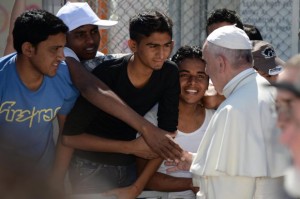
By editor - 17 April, 2016

Pope Francis greets migrants and refugees at the Moria refugee camp on the island of Lesbos, Greece. EPA/FILIPPO MONTEFORTE / POOL
Pope Francis took three Syrian families and their six children back with him on the plane to Italy when he left the Greek island of Lesbos after his six-hour visit on Saturday.
The Syrian refugees were chosen from amongst those who were already present in the refugee camp on Lesbos before the recent deal was signed between the EU and Turkey.
According to the Director of the Vatican’s Press Office, Fr Federico Lombardi, the Pope wished to make a gesture of welcome and solidarity to the refugees.
The initiative was organised and made possible by discussions between the (Vatican) Secretariat of State and the Greek and Italian authorities.
All the members of the three Syrian refugee families are Muslims. Two of the families come from Damascus and the third one comes from Deir Azzor which is located in an area controlled by the so-called Islamic State group. The homes of all three families were destroyed by shelling.
The Vatican will be taking care of the costs involved in housing and looking after the refugees. According to Fr Lombardi, the Sant’Egidio community will be providing the initial shelter for them.
During this visit to Lesbos on Saturday, Pope Francis expressed his admiration for the Greek people who, despite their own great difficulties, have “kept open their hearts and their doors.”
Addressing civil authorities and the catholic community on the island, the Pontiff renewed his “heartfelt plea for responsibility and solidarity in the face of this tragic situation.”
In his address, the Pope said he had wanted to visit Lesbos ever since migrants arrived there seeking peace and dignity.
He continued, “I wish to express my admiration for the Greek people who, despite their own great difficulties, have kept open their hearts and their doors. Many ordinary men and women have made available the little they have and shared it with those who have lost everything.”
He emphasised, “God will repay this generosity, and that of other surrounding nations who from the beginning have welcomed with great openness the large numbers of people forced to migrate.”
He also paid tribute to the “generous presence of many volunteers and various associations that, together with public institutions, have offered and continue to offer their assistance, visibly expressing their fraternal concern”.
The Pope then renewed his “heartfelt plea for responsibility and solidarity in the face of this tragic situation”.
He said that many migrants who have come to the island and other places in Greece are living in trying conditions, in an atmosphere of anxiety and fear, at times even of despair, due to material hardship and uncertainty for the future.
The Pope acknowledged that the worries expressed by institutions and people, both in Greece and in other European countries, are understandable and legitimate.
“We must never forget, however, that migrants, rather than simply being a statistic, are first of all persons who have faces, names and individual stories.”
He added, “Europe is the homeland of human rights, and whoever sets foot on European soil ought to sense this, and thus become more aware of the duty to respect and defend those rights.”
“Unfortunately, some, including many infants, could not even make it to these shores: they died at sea, victims of unsafe and inhumane means of transport, prey to unscrupulous thugs.”
Pope Francis, along with Ecumenical Patriarch Bartholomew, and Archbishop Ieronymos of Athens and All Greece, released a joint declaration during their visit to the Greek island of Lesbos on Saturday.
The three leaders signed the joint declaration at the end of their visit to the Moria refugee camp.
The declaration calls on the international community to respond with generosity and compassion to the tragedy of forced migration, calling it a ‘crisis of humanity’.
In the face of this crisis, the church leaders restated their desire to work toward the unity of all Christians.
“For our part, in obedience to the will of our Lord Jesus Christ, we firmly and wholeheartedly resolve to intensify our efforts to promote the full unity of all Christians… By defending the fundamental human rights of refugees, asylum-seekers and migrants, and the many marginalised people in our societies, we aim to fulfil the Churches’ mission of service to the world.”
In conclusion, the declaration urges the international community to “make the protection of human lives a priority and, at every level, to support inclusive policies which extend to all religious communities”.